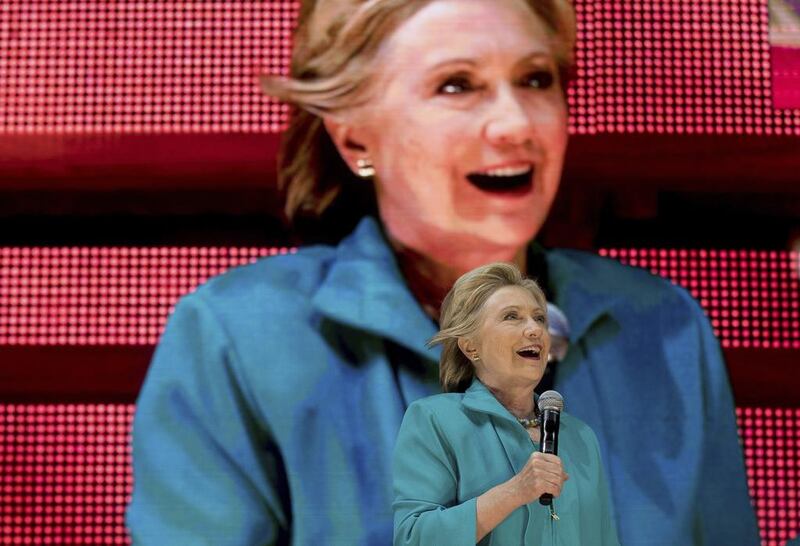Is it the most extraordinary “October surprise” yet, or a meaningless illusion? Either “this changes everything” as Donald Trump exulted, or it amounts to nothing. No one has a clue, and the American presidential election now hangs in limbo, with no indication of when or how the most basic questions about the latest dramatic development will be answered.
On Thursday night, there was every reason to believe Donald Trump had virtually no chance of beating Hillary Clinton. She held a substantial lead according to most polls, both nationally and in the all-important swing states, and a large funding advantage.
But by Friday afternoon, the election may have suddenly been thrown wide open. FBI director James Comey informed Congress that the bureau is reviewing newly discovered emails that “appear to be pertinent” to an investigation into Mrs Clinton’s communications that everyone had considered resolved.
Mrs Clinton has been haunted by her use of a private email server when she was secretary of state. Almost 32,000 emails she considered “personal communications” were deleted from the server in an apparent violation of regulations adopted 10 months into her tenure.
On July 5, Mr Comey announced the FBI was recommending no criminal charges be filed, and that he did not believe any laws had been broken. Nonetheless, he chided her for being “extremely careless”.
The FBI says it has discovered emails that “appear to be pertinent” to the server investigation, whatever that might mean, on a computer belonging to disgraced former congressman Anthony Weiner, the estranged husband of a key aide to Mrs Clinton, Huma Abedin. Mr Weiner, who has a long history of reckless online sexual behaviour, is the subject of an unrelated investigation for allegedly sending improper messages to a 15-year-old girl.
A virtual tsunami of breathless, but often misleading, reportage suggested the FBI had “reopened” its investigation into Mrs Clinton’s server.
The FBI says that it will review the messages to determine what, if any, relevance they have to that case. But it hasn’t said how many emails will be examined, whether any were to or from Mrs Clinton, if any involve classified formation, or why the FBI considers them potentially “pertinent”.
Mr Comey says he felt bound to inform Congress, even though the bureau has no idea about “the significance of this newly discovered collection of emails”.
So, at this stage, there is no indication that the FBI has discovered anything mildly interesting, let alone important, not to mention scandalous.
The public, however, was subjected to reporting that implied that a massive scandal had been uncovered or confirmed. The words Clinton, emails, FBI and investigation were typically strung together in a manner that created the impression that the Democratic nominee is a target of a major new criminal investigation, or that the old case has been reopened in some meaningful sense (it was never formally “closed”), or that a new bonanza of information (the word “bombshell” was ubiquitous) has been discovered. None of that is, at least for now, even remotely accurate.
Yet the presidential campaign has been thrown into utter disarray. Mr Trump preposterously declared that “this is bigger than Watergate”. Mrs Clinton and members of Congress from both parties demanded that the FBI release “the full and complete facts immediately”. The justice department said it strongly opposed Mr Comey’s letter because it violates policies prohibiting influencing elections.
It is exceptionally difficult to evaluate the impact of Mr Comey’s reckless letter, which raised innumerably more questions than it answered.
Voters may have long ago chosen sides regarding Mrs Clinton’s private server. Or the controversy might breathe new life into the notions that she is untrustworthy, dishonest and corrupt. Even if few people alter their basic evaluation of the candidates, the uproar could prompt potential Clinton voters to stay home on election day.
Mr Comey has, intentionally or not, whipped up a colossal, and potentially game-changing, controversy that is entirely content-free. He has, in effect, constructed a gigantic blank screen on to which the media and the public can project their darkest fantasies about Mrs Clinton, with the implicit imprimatur of the FBI.
It’s hard to imagine more irresponsible conduct or a greater public disservice. Given the forthcoming election, the FBI should shift heaven and Earth to provide as much detail as soon as possible to the public about these emails, and the nature and scope of their inquiry. Even then, assuming that this is the tempest in a teapot the Clinton campaign insists it must be, real harm to the democratic process may have already been done.
The American public has an absolute right and urgent need to know what, if anything, the FBI has actually discovered. Heading into the final week of the campaign with such a shadow hanging over the election and without clarification would be indefensible and intolerable.
Hussein Ibish is a senior resident scholar at the Arab Gulf States Institute in Washington
On Twitter: @ibishblog





